Islamic State women defiant in face of lost caliphate
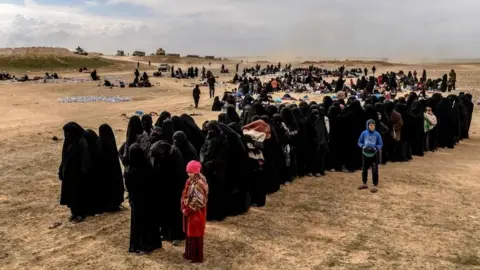 AFP
AFPAs the battle against the Islamic State (IS) group in eastern Syria enters its final stages, the BBC's Jewan Abdi says the mood amongst many of the jihadists' supporters who have left the area, including many women, remains defiant.
The encampment in the village of Baghuz is barely more than a few holes in the dirt covered with blankets. It is squalid and filthy.
But above it flies the black Islamic State flag, fresh and clean. IS fighters had raised it only the day before, an act of defiance in the face of overwhelming odds.
"That's a sign they will fight," says a soldier belonging to the US-backed Syrian Democratic Forces (SDF) on the front lines battling the jihadists.
Just 24 hours later the battle resumed. It was the end of a ceasefire that had seen more than 12,000 leave in the preceding few days.
One day last week in the early morning, more than 20 trucks led by Humvees armed with machine guns went inside the tiny IS enclave to evacuate jihadist fighters and their families.
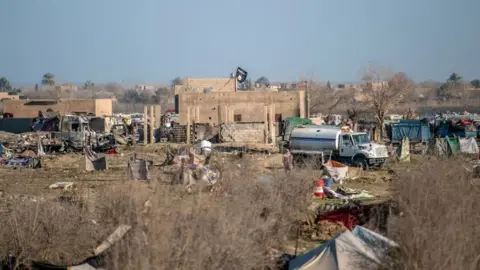 AFP
AFPI followed these vehicles on their return journey to the desert where they were checked, separated, and sent on to camps run by the SDF forces. One military commander told me the total number of people evacuated was about 7,000.
The hunger and anger was evident on their faces. As I walked among them with my camera, trying to talk to them and film, several IS women suddenly attacked me and threw stones, dust and cans.
"Go film the brothers, don't come here. Go. Leave. Go film them, we're the woman of the Islamic State, Allahu Akbar, Allahu Akbar (God is greatest)," they said.
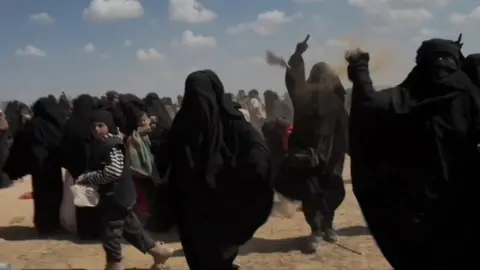
A few weeks ago, the SDF estimated the number of IS families and fighters left remaining in Baghuz to be between 1,500 and 2,000 people. But in just two days last week, 9,000 people emerged.
The final territory under IS's control may be on its last legs in Syria, but the ideology remains strong among those who have left.
Many of the IS women I encountered threatened of violent jihad and raising their children to become jihadist fighters.
Two captors for one woman
Among the thousands of people turning up out of Baghuz, I also found victims of IS's notorious brutality, including one Yazidi woman called Adiba.
A mother of two, Adiba was enslaved for five years after IS attacked her small village in Sinjar, northern Iraq, in 2014.
Her husband was one of the hundreds of Yazidi men killed by the jihadist group, and she - like thousands of Yazidi women - was forced to convert to Islam and was used as a sex slave.
She says she was enslaved by a Moroccan man who beat her constantly and raped her. He was the father of her two-year-old child.
"I had to marry him. When we were alone he wasn't good to me, he was always angry with me, but in front of people he treated me well," Adiba tells me.
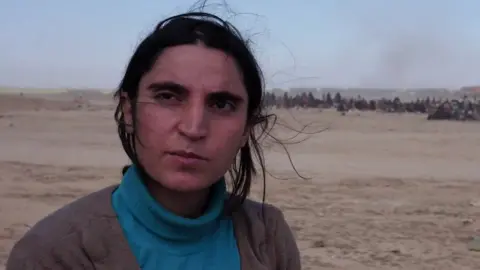
After Adiba's first captor died, she was taken by another Moroccan man named Ahmed - orders she says came from her first captor in the event of his death.
Ahmed, who surrendered to the SDF last week, has denied enslaving Adiba.
Most of the people evacuated from Baghuz recently, including many foreigners who travelled to Syria and Iraq to live under IS rule, have been transported to the SDF-controlled camp al-Hol, in the north-east of the country.
The camp was designed to accommodate 20,000 people but the UN says conditions there are dire as the numbers have risen to more than 66,000.
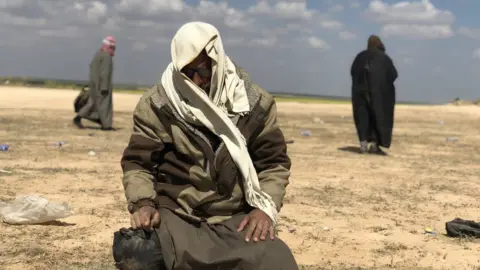
The global dream of an Islamic State caliphate - a state governed in accordance with Islamic law - is on the brink of collapse, with most of its leadership gone and many captured by the SDF and coalition forces.
Hundreds of IS fighters have surrendered. Separated from their families, they sit in long queues in an area inaccessible to journalists, where US Special Forces and SDF soldiers interrogate them and send them on to detention centres and prisons under Kurdish control.
After losing their self-proclaimed caliphate, a sense of sadness, anger and indignation was clear among these fighters who are stuck in the middle of the desert, waiting to be moved into detention camps, away from their wives and children.


